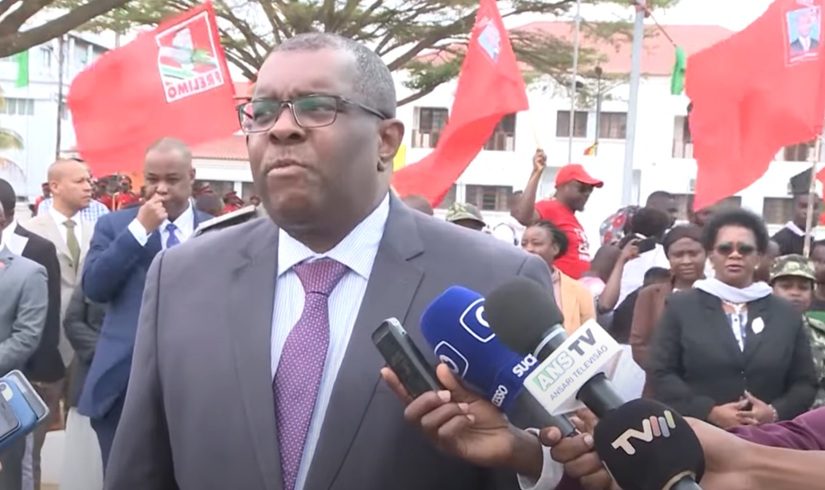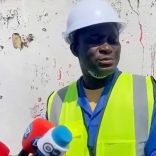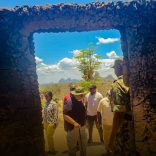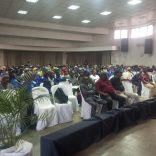Mozambique: Quelimane mayor handed four-month prison sentence for disobedience, commuted to a ...
Mozambique: At least 45 homes burned down by alleged terrorists in Nampula province – government | Watch

Screengrab: STV
At least 45 homes in two villages in Nampula, northern Mozambique, were burned down on Wednesday by alleged terrorist groups moving from neighbouring Cabo Delgado province, the government confirmed on Saturday.
“Terrorists are moving from Cabo Delgado to Nampula province, having entered Memba district where they committed several acts, setting fire to homes in two villages, one in the administrative post of Lúrio and the other in the administrative post of Chipene,” said Plácido Nerino Pereira, Secretary of State for Nampula province.
“The Defence and Security Forces responded promptly, and these criminals are being defeated,” the government official added, noting that “there are currently no reports of deaths.”
“We still have no information on deaths. But in one of the villages, 30 homes were burned and in another, 15 homes. There are displaced people who are still being counted, some in the district headquarters of Memba and others in Eráti,” he added.
The Mozambican government assures that it is reinforcing security measures to protect the affected communities and that surveillance and patrol operations have been intensified in the region, with the aim of neutralising any remaining groups and ensuring stability.
“A message of courage, a message of great strength, and the fact that the government will not abandon them,” said the Secretary of State for Nampula province.
Gas-rich Cabo Delgado province, in the north of the country, has been facing an armed rebellion since 2017, which has caused thousands of deaths and a humanitarian crisis, with more than a million people displaced since then. In May, attacks were also recorded in the neighbouring province of Niassa and now in Nampula, an area that has hosted thousands of displaced people from the districts attacked in recent months in southern Cabo Delgado.
By the end of July, attacks by these groups had already displaced more than 57,000 people in the district of Chiúre, southern Cabo Delgado province, according to previous official data.
Meanwhile, the province has seen a resurgence of attacks by rebel groups, with the districts of Chiúre, Muidumbe, Quissanga, Ancuabe and Meluco being targeted. More recently, Mocímboa da Praia—where the first major terrorist attack took place on 5 October 2017—also recorded several deaths, leading the organisation Doctors Without Borders to suspend local activities for security reasons.
According to United Nations data, between 19 and 26 September 2025, the escalation of attacks and insecurity caused by armed groups in Cabo Delgado also displaced approximately 22,000 people in the districts of Balama, Mocímboa da Praia and Nangade.
Mozambican President Daniel Chapo said on 25 September that security in Cabo Delgado had improved, but that the terrorist threat remained, asking the Mozambique Armed Defence Forces (FADM) for “strategies to incinerate” these insurgent groups.
“Reality dictates that this effort has not been sufficient. Therefore, as we celebrate the 61st anniversary of the FADM, we want to guide the three pillars of the Defence and Security Forces to find strategies to incinerate terrorism in our country,” he stated.
Daniel Chapo acknowledged the “complexity” of the counter-terrorism mission, but emphasised the level of preparedness achieved by the Armed Forces in recent years.
“We know that over the years, they have gained experience, created structures and trained many personnel in the academies, capable of masterfully facing these challenges. Therefore, we recommend sending the best personnel to the Northern Operational Theatre. Terrorism cannot be defeated by leaving the best military personnel, the best personnel, the family members or the children of the leaders in their offices,” he noted.
“Every citizen who is part of the Defence and Security Forces must go to the Northern Operational Theatre. This is non-negotiable,” he warned.












Leave a Reply
Be the First to Comment!
You must be logged in to post a comment.
You must be logged in to post a comment.